Higher Education: Exploring and Contesting the Curriculum Report
VerifiedAdded on 2022/12/30
|6
|1752
|71
Report
AI Summary
This report delves into the multifaceted influences shaping curriculum development, specifically focusing on the impact of political and cultural forces on educators and learners. The analysis centers on the Australian curriculum and examines four key curriculum types: enacted, negotiated, emergent, and hidden. The enacted curriculum is defined by the actual content and interactions within the classroom, influenced by resources, educator knowledge, and community expectations. The negotiated curriculum considers the diverse backgrounds of learners and involves collaboration with parents and the community. The emergent curriculum emphasizes responsive teaching and philosophy-based learning, while the hidden curriculum encompasses implicit lessons and values conveyed through educator choices and societal norms. The report highlights how these curricula types are impacted by factors such as government policies, cultural norms, and social inequalities, and how these factors can affect learning outcomes and professional growth.
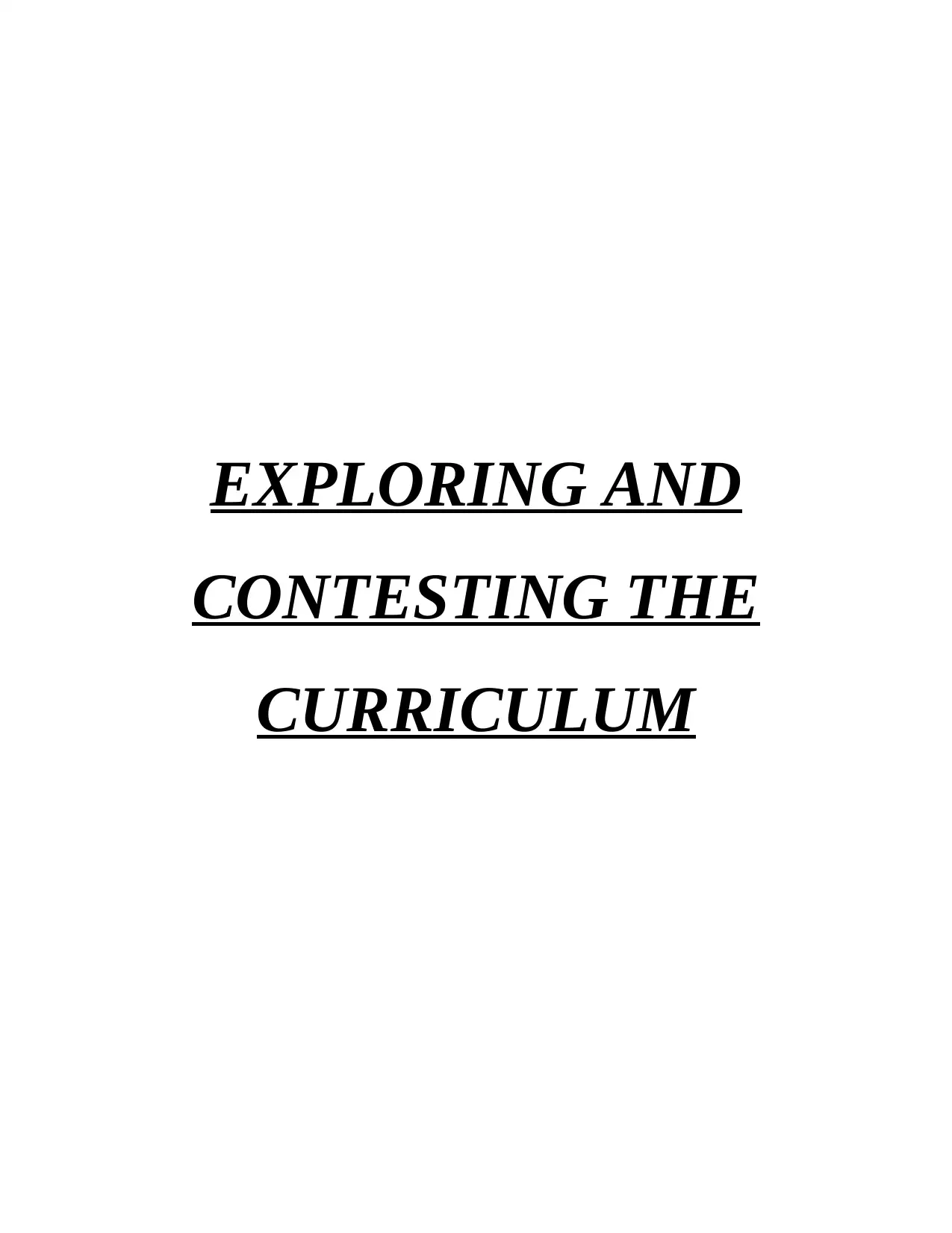
EXPLORING AND
CONTESTING THE
CURRICULUM
CONTESTING THE
CURRICULUM
Paraphrase This Document
Need a fresh take? Get an instant paraphrase of this document with our AI Paraphraser
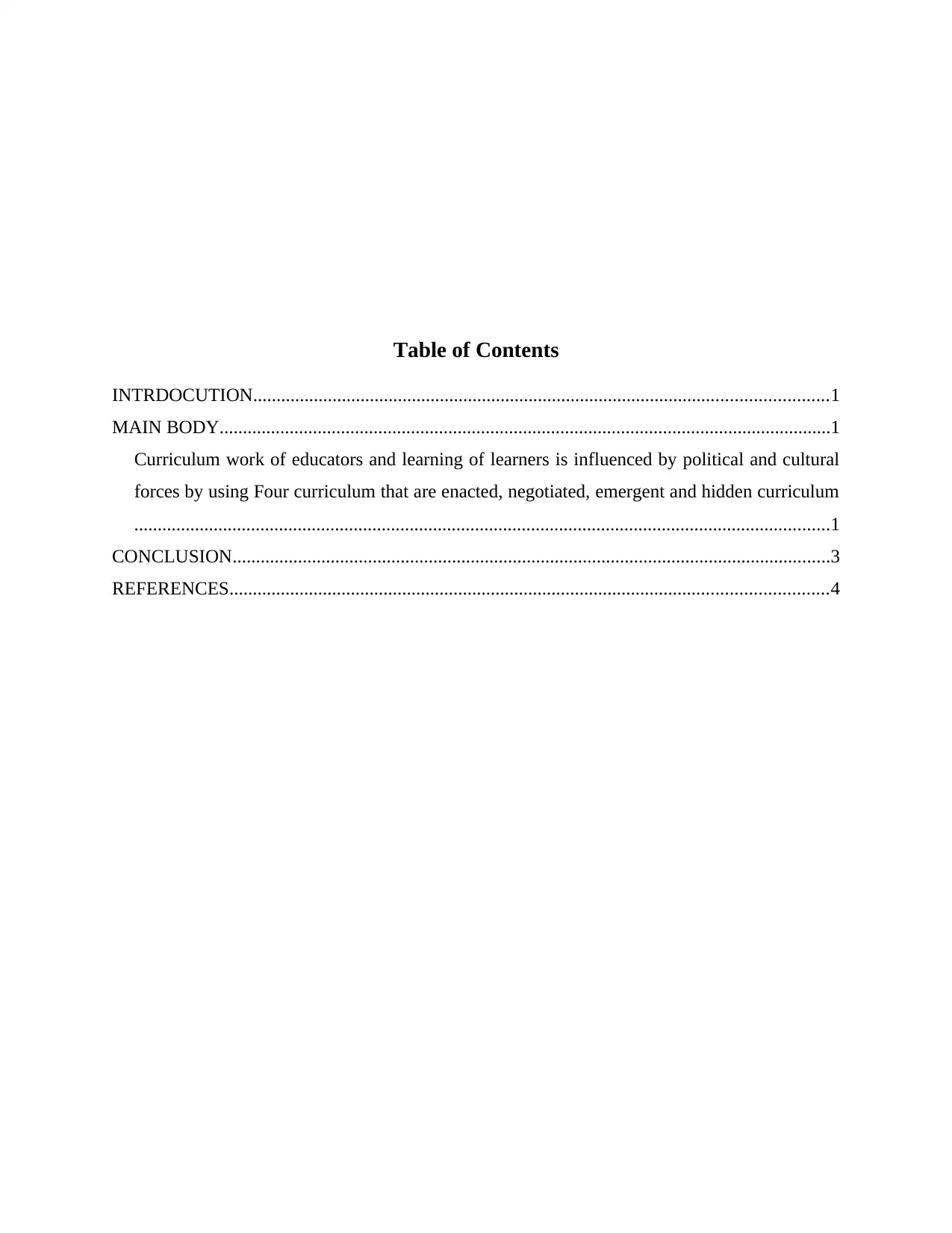
Table of Contents
INTRDOCUTION...........................................................................................................................1
MAIN BODY...................................................................................................................................1
Curriculum work of educators and learning of learners is influenced by political and cultural
forces by using Four curriculum that are enacted, negotiated, emergent and hidden curriculum
.....................................................................................................................................................1
CONCLUSION................................................................................................................................3
REFERENCES................................................................................................................................4
INTRDOCUTION...........................................................................................................................1
MAIN BODY...................................................................................................................................1
Curriculum work of educators and learning of learners is influenced by political and cultural
forces by using Four curriculum that are enacted, negotiated, emergent and hidden curriculum
.....................................................................................................................................................1
CONCLUSION................................................................................................................................3
REFERENCES................................................................................................................................4
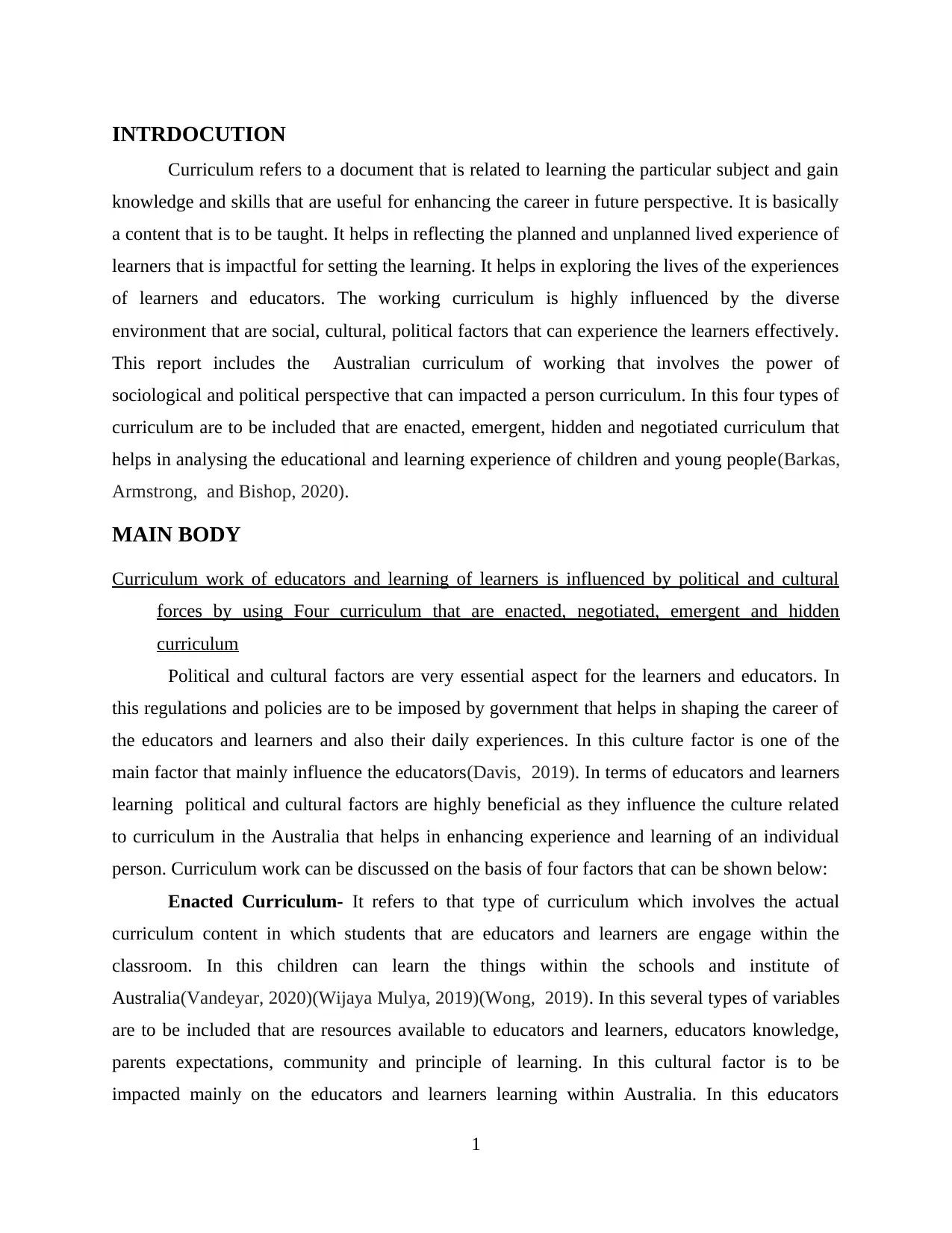
INTRDOCUTION
Curriculum refers to a document that is related to learning the particular subject and gain
knowledge and skills that are useful for enhancing the career in future perspective. It is basically
a content that is to be taught. It helps in reflecting the planned and unplanned lived experience of
learners that is impactful for setting the learning. It helps in exploring the lives of the experiences
of learners and educators. The working curriculum is highly influenced by the diverse
environment that are social, cultural, political factors that can experience the learners effectively.
This report includes the Australian curriculum of working that involves the power of
sociological and political perspective that can impacted a person curriculum. In this four types of
curriculum are to be included that are enacted, emergent, hidden and negotiated curriculum that
helps in analysing the educational and learning experience of children and young people(Barkas,
Armstrong, and Bishop, 2020).
MAIN BODY
Curriculum work of educators and learning of learners is influenced by political and cultural
forces by using Four curriculum that are enacted, negotiated, emergent and hidden
curriculum
Political and cultural factors are very essential aspect for the learners and educators. In
this regulations and policies are to be imposed by government that helps in shaping the career of
the educators and learners and also their daily experiences. In this culture factor is one of the
main factor that mainly influence the educators(Davis, 2019). In terms of educators and learners
learning political and cultural factors are highly beneficial as they influence the culture related
to curriculum in the Australia that helps in enhancing experience and learning of an individual
person. Curriculum work can be discussed on the basis of four factors that can be shown below:
Enacted Curriculum- It refers to that type of curriculum which involves the actual
curriculum content in which students that are educators and learners are engage within the
classroom. In this children can learn the things within the schools and institute of
Australia(Vandeyar, 2020)(Wijaya Mulya, 2019)(Wong, 2019). In this several types of variables
are to be included that are resources available to educators and learners, educators knowledge,
parents expectations, community and principle of learning. In this cultural factor is to be
impacted mainly on the educators and learners learning within Australia. In this educators
1
Curriculum refers to a document that is related to learning the particular subject and gain
knowledge and skills that are useful for enhancing the career in future perspective. It is basically
a content that is to be taught. It helps in reflecting the planned and unplanned lived experience of
learners that is impactful for setting the learning. It helps in exploring the lives of the experiences
of learners and educators. The working curriculum is highly influenced by the diverse
environment that are social, cultural, political factors that can experience the learners effectively.
This report includes the Australian curriculum of working that involves the power of
sociological and political perspective that can impacted a person curriculum. In this four types of
curriculum are to be included that are enacted, emergent, hidden and negotiated curriculum that
helps in analysing the educational and learning experience of children and young people(Barkas,
Armstrong, and Bishop, 2020).
MAIN BODY
Curriculum work of educators and learning of learners is influenced by political and cultural
forces by using Four curriculum that are enacted, negotiated, emergent and hidden
curriculum
Political and cultural factors are very essential aspect for the learners and educators. In
this regulations and policies are to be imposed by government that helps in shaping the career of
the educators and learners and also their daily experiences. In this culture factor is one of the
main factor that mainly influence the educators(Davis, 2019). In terms of educators and learners
learning political and cultural factors are highly beneficial as they influence the culture related
to curriculum in the Australia that helps in enhancing experience and learning of an individual
person. Curriculum work can be discussed on the basis of four factors that can be shown below:
Enacted Curriculum- It refers to that type of curriculum which involves the actual
curriculum content in which students that are educators and learners are engage within the
classroom. In this children can learn the things within the schools and institute of
Australia(Vandeyar, 2020)(Wijaya Mulya, 2019)(Wong, 2019). In this several types of variables
are to be included that are resources available to educators and learners, educators knowledge,
parents expectations, community and principle of learning. In this cultural factor is to be
impacted mainly on the educators and learners learning within Australia. In this educators
1
⊘ This is a preview!⊘
Do you want full access?
Subscribe today to unlock all pages.

Trusted by 1+ million students worldwide

knowledge and beliefs is mainly influenced how to intended curriculum is to be translated within
classroom. In this learners culture containing more power to learn the new experience and
activities. In this government laws and regulations are to be impacted mainly related to the
curriculum learning of poverty people(Sweetman, 2019). In this women, children, older people
are born in countries where English is not so important and in this government of Australia
cannot support due to this social iniquity is to be reflected. As these type of learners cannot learn
within the schools and institute as they get their learning curriculum from their only parents. This
will impacted their enacted learning and also create a high challenge in future because of huge
competition are to be present within market to developed the growth in professional life. The
culture of society is reflected that this type of curriculum is to be only for those people who have
stable family background. In this educators can focus on how to deliver their information into the
classroom so that students can learned the new things appropriately that helps in their future
perspective(O’Connor, 2019).
Negotiated Curriculum- This type reflects that curriculum do not always identify by the
experiences, background of learners as it is culturally diversified or marginalised backgrounds.
In this case educators are reach out the learners to opened the learning of the parents,
community and learners(Spring, Adams, and Hardman, 2019). It is highly an opportunity to
learner because it helps the community to get more opportunity related to enhancing standard
and professionalism. In this culture is influenced the learning of learners. As it helps the society
to enhance their living standard. In this Australian culture highly impacted this curriculum
because of unequal society. In this poor people can take the advantage of this aspect because
many educators can provide the charity to provide the free education to people who need this. It
helps in developing the community living standard. In this political factor is not in favour of
poverty gender ethnicity due to this many professionals educators can provide the knowledge to
the women and children so that they will develops their career effectively. It also helps the
learner to take decisions on the basis of their experience that will also develops high level of
opportunities(Papadopoulos, and Reilly, 2020).
Emergent Curriculum- It refers to that type of curriculum which is based on philosophy
of teaching and also planning aspect in which learner can being responsive towards their interest
so that they can create the meaning experience. In this factor culture is highly important to
planning the curriculum because it is essence of education that is useful to transmit the cultural
2
classroom. In this learners culture containing more power to learn the new experience and
activities. In this government laws and regulations are to be impacted mainly related to the
curriculum learning of poverty people(Sweetman, 2019). In this women, children, older people
are born in countries where English is not so important and in this government of Australia
cannot support due to this social iniquity is to be reflected. As these type of learners cannot learn
within the schools and institute as they get their learning curriculum from their only parents. This
will impacted their enacted learning and also create a high challenge in future because of huge
competition are to be present within market to developed the growth in professional life. The
culture of society is reflected that this type of curriculum is to be only for those people who have
stable family background. In this educators can focus on how to deliver their information into the
classroom so that students can learned the new things appropriately that helps in their future
perspective(O’Connor, 2019).
Negotiated Curriculum- This type reflects that curriculum do not always identify by the
experiences, background of learners as it is culturally diversified or marginalised backgrounds.
In this case educators are reach out the learners to opened the learning of the parents,
community and learners(Spring, Adams, and Hardman, 2019). It is highly an opportunity to
learner because it helps the community to get more opportunity related to enhancing standard
and professionalism. In this culture is influenced the learning of learners. As it helps the society
to enhance their living standard. In this Australian culture highly impacted this curriculum
because of unequal society. In this poor people can take the advantage of this aspect because
many educators can provide the charity to provide the free education to people who need this. It
helps in developing the community living standard. In this political factor is not in favour of
poverty gender ethnicity due to this many professionals educators can provide the knowledge to
the women and children so that they will develops their career effectively. It also helps the
learner to take decisions on the basis of their experience that will also develops high level of
opportunities(Papadopoulos, and Reilly, 2020).
Emergent Curriculum- It refers to that type of curriculum which is based on philosophy
of teaching and also planning aspect in which learner can being responsive towards their interest
so that they can create the meaning experience. In this factor culture is highly important to
planning the curriculum because it is essence of education that is useful to transmit the cultural
2
Paraphrase This Document
Need a fresh take? Get an instant paraphrase of this document with our AI Paraphraser
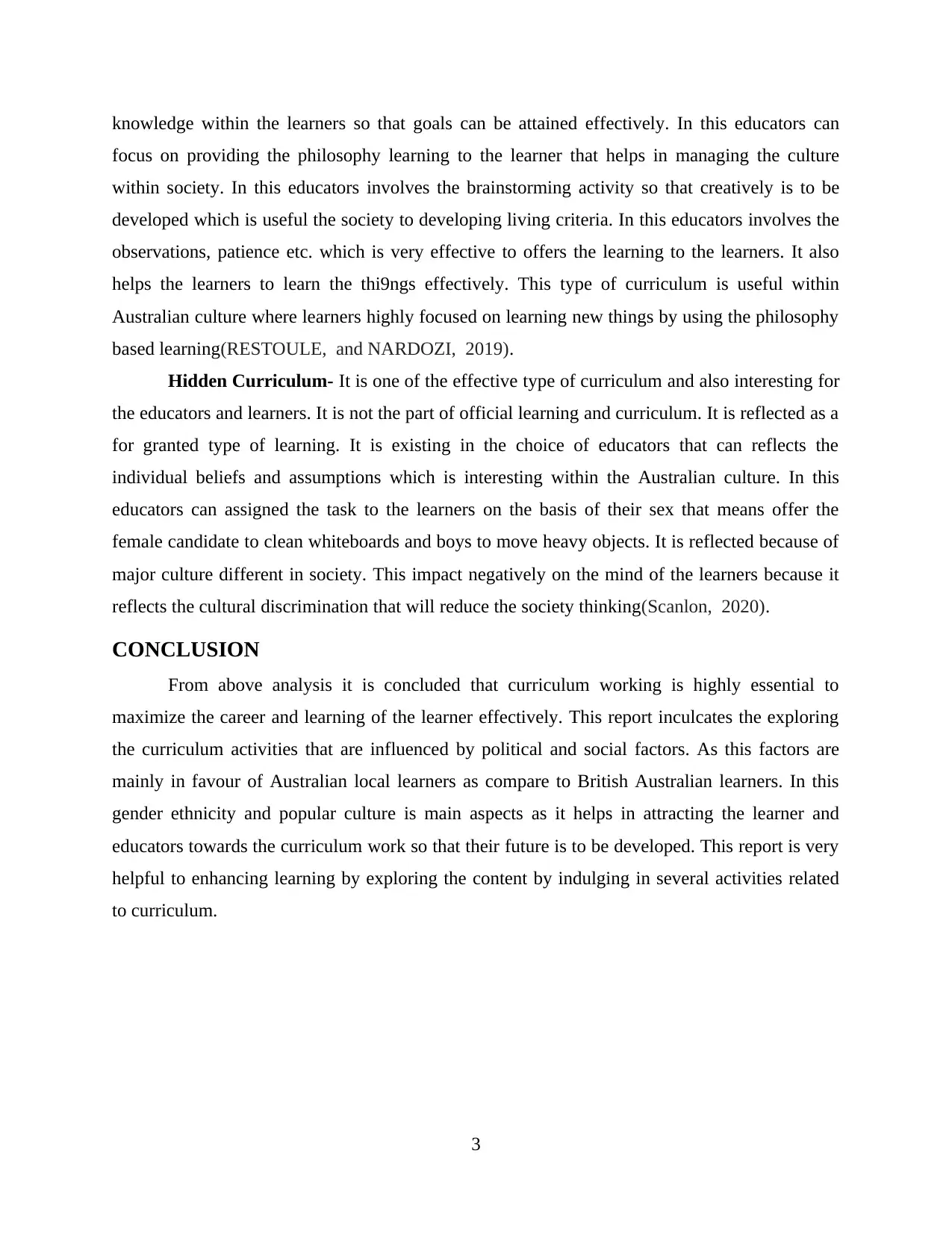
knowledge within the learners so that goals can be attained effectively. In this educators can
focus on providing the philosophy learning to the learner that helps in managing the culture
within society. In this educators involves the brainstorming activity so that creatively is to be
developed which is useful the society to developing living criteria. In this educators involves the
observations, patience etc. which is very effective to offers the learning to the learners. It also
helps the learners to learn the thi9ngs effectively. This type of curriculum is useful within
Australian culture where learners highly focused on learning new things by using the philosophy
based learning(RESTOULE, and NARDOZI, 2019).
Hidden Curriculum- It is one of the effective type of curriculum and also interesting for
the educators and learners. It is not the part of official learning and curriculum. It is reflected as a
for granted type of learning. It is existing in the choice of educators that can reflects the
individual beliefs and assumptions which is interesting within the Australian culture. In this
educators can assigned the task to the learners on the basis of their sex that means offer the
female candidate to clean whiteboards and boys to move heavy objects. It is reflected because of
major culture different in society. This impact negatively on the mind of the learners because it
reflects the cultural discrimination that will reduce the society thinking(Scanlon, 2020).
CONCLUSION
From above analysis it is concluded that curriculum working is highly essential to
maximize the career and learning of the learner effectively. This report inculcates the exploring
the curriculum activities that are influenced by political and social factors. As this factors are
mainly in favour of Australian local learners as compare to British Australian learners. In this
gender ethnicity and popular culture is main aspects as it helps in attracting the learner and
educators towards the curriculum work so that their future is to be developed. This report is very
helpful to enhancing learning by exploring the content by indulging in several activities related
to curriculum.
3
focus on providing the philosophy learning to the learner that helps in managing the culture
within society. In this educators involves the brainstorming activity so that creatively is to be
developed which is useful the society to developing living criteria. In this educators involves the
observations, patience etc. which is very effective to offers the learning to the learners. It also
helps the learners to learn the thi9ngs effectively. This type of curriculum is useful within
Australian culture where learners highly focused on learning new things by using the philosophy
based learning(RESTOULE, and NARDOZI, 2019).
Hidden Curriculum- It is one of the effective type of curriculum and also interesting for
the educators and learners. It is not the part of official learning and curriculum. It is reflected as a
for granted type of learning. It is existing in the choice of educators that can reflects the
individual beliefs and assumptions which is interesting within the Australian culture. In this
educators can assigned the task to the learners on the basis of their sex that means offer the
female candidate to clean whiteboards and boys to move heavy objects. It is reflected because of
major culture different in society. This impact negatively on the mind of the learners because it
reflects the cultural discrimination that will reduce the society thinking(Scanlon, 2020).
CONCLUSION
From above analysis it is concluded that curriculum working is highly essential to
maximize the career and learning of the learner effectively. This report inculcates the exploring
the curriculum activities that are influenced by political and social factors. As this factors are
mainly in favour of Australian local learners as compare to British Australian learners. In this
gender ethnicity and popular culture is main aspects as it helps in attracting the learner and
educators towards the curriculum work so that their future is to be developed. This report is very
helpful to enhancing learning by exploring the content by indulging in several activities related
to curriculum.
3
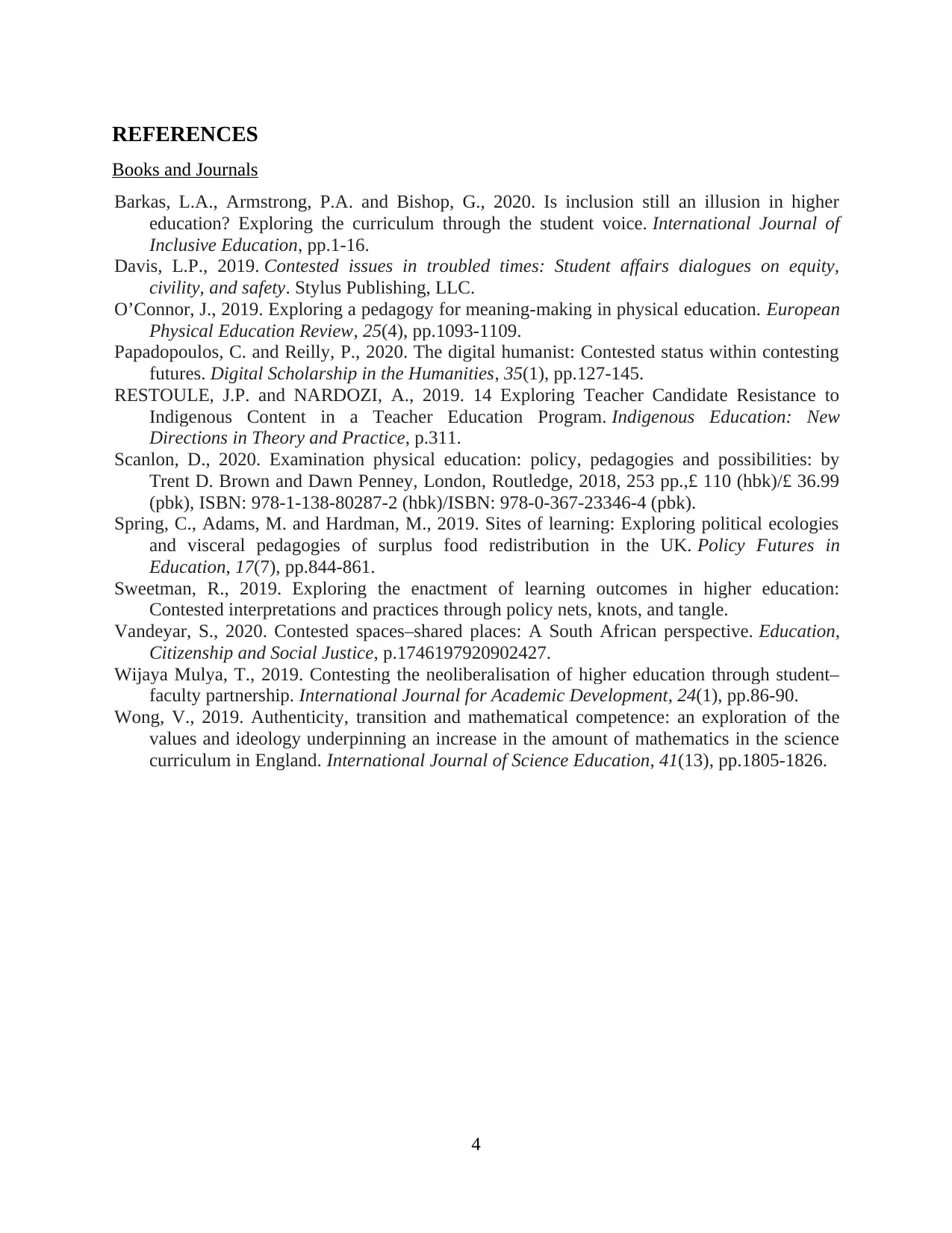
REFERENCES
Books and Journals
Barkas, L.A., Armstrong, P.A. and Bishop, G., 2020. Is inclusion still an illusion in higher
education? Exploring the curriculum through the student voice. International Journal of
Inclusive Education, pp.1-16.
Davis, L.P., 2019. Contested issues in troubled times: Student affairs dialogues on equity,
civility, and safety. Stylus Publishing, LLC.
O’Connor, J., 2019. Exploring a pedagogy for meaning-making in physical education. European
Physical Education Review, 25(4), pp.1093-1109.
Papadopoulos, C. and Reilly, P., 2020. The digital humanist: Contested status within contesting
futures. Digital Scholarship in the Humanities, 35(1), pp.127-145.
RESTOULE, J.P. and NARDOZI, A., 2019. 14 Exploring Teacher Candidate Resistance to
Indigenous Content in a Teacher Education Program. Indigenous Education: New
Directions in Theory and Practice, p.311.
Scanlon, D., 2020. Examination physical education: policy, pedagogies and possibilities: by
Trent D. Brown and Dawn Penney, London, Routledge, 2018, 253 pp.,£ 110 (hbk)/£ 36.99
(pbk), ISBN: 978-1-138-80287-2 (hbk)/ISBN: 978-0-367-23346-4 (pbk).
Spring, C., Adams, M. and Hardman, M., 2019. Sites of learning: Exploring political ecologies
and visceral pedagogies of surplus food redistribution in the UK. Policy Futures in
Education, 17(7), pp.844-861.
Sweetman, R., 2019. Exploring the enactment of learning outcomes in higher education:
Contested interpretations and practices through policy nets, knots, and tangle.
Vandeyar, S., 2020. Contested spaces–shared places: A South African perspective. Education,
Citizenship and Social Justice, p.1746197920902427.
Wijaya Mulya, T., 2019. Contesting the neoliberalisation of higher education through student–
faculty partnership. International Journal for Academic Development, 24(1), pp.86-90.
Wong, V., 2019. Authenticity, transition and mathematical competence: an exploration of the
values and ideology underpinning an increase in the amount of mathematics in the science
curriculum in England. International Journal of Science Education, 41(13), pp.1805-1826.
4
Books and Journals
Barkas, L.A., Armstrong, P.A. and Bishop, G., 2020. Is inclusion still an illusion in higher
education? Exploring the curriculum through the student voice. International Journal of
Inclusive Education, pp.1-16.
Davis, L.P., 2019. Contested issues in troubled times: Student affairs dialogues on equity,
civility, and safety. Stylus Publishing, LLC.
O’Connor, J., 2019. Exploring a pedagogy for meaning-making in physical education. European
Physical Education Review, 25(4), pp.1093-1109.
Papadopoulos, C. and Reilly, P., 2020. The digital humanist: Contested status within contesting
futures. Digital Scholarship in the Humanities, 35(1), pp.127-145.
RESTOULE, J.P. and NARDOZI, A., 2019. 14 Exploring Teacher Candidate Resistance to
Indigenous Content in a Teacher Education Program. Indigenous Education: New
Directions in Theory and Practice, p.311.
Scanlon, D., 2020. Examination physical education: policy, pedagogies and possibilities: by
Trent D. Brown and Dawn Penney, London, Routledge, 2018, 253 pp.,£ 110 (hbk)/£ 36.99
(pbk), ISBN: 978-1-138-80287-2 (hbk)/ISBN: 978-0-367-23346-4 (pbk).
Spring, C., Adams, M. and Hardman, M., 2019. Sites of learning: Exploring political ecologies
and visceral pedagogies of surplus food redistribution in the UK. Policy Futures in
Education, 17(7), pp.844-861.
Sweetman, R., 2019. Exploring the enactment of learning outcomes in higher education:
Contested interpretations and practices through policy nets, knots, and tangle.
Vandeyar, S., 2020. Contested spaces–shared places: A South African perspective. Education,
Citizenship and Social Justice, p.1746197920902427.
Wijaya Mulya, T., 2019. Contesting the neoliberalisation of higher education through student–
faculty partnership. International Journal for Academic Development, 24(1), pp.86-90.
Wong, V., 2019. Authenticity, transition and mathematical competence: an exploration of the
values and ideology underpinning an increase in the amount of mathematics in the science
curriculum in England. International Journal of Science Education, 41(13), pp.1805-1826.
4
⊘ This is a preview!⊘
Do you want full access?
Subscribe today to unlock all pages.

Trusted by 1+ million students worldwide
1 out of 6
Related Documents
Your All-in-One AI-Powered Toolkit for Academic Success.
+13062052269
info@desklib.com
Available 24*7 on WhatsApp / Email
![[object Object]](/_next/static/media/star-bottom.7253800d.svg)
Unlock your academic potential
Copyright © 2020–2026 A2Z Services. All Rights Reserved. Developed and managed by ZUCOL.





